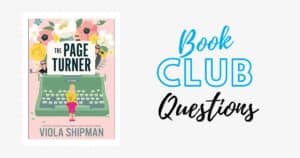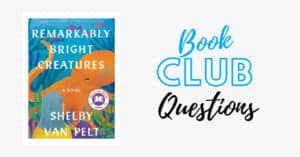Book Clubs 101: Ultimate Guide to Starting or Joining
Looks Like Books contains affiliate links and is a member of the Amazon Services LLC Associates Program. If you make a purchase using one of these affiliate links I may receive compensation at no extra cost to you. See my Disclaimer to learn more.
If you’re part of a book club – or thinking of starting one – you already know how powerful it can be to share the reading experience. Whether you’re in a neighborhood group, a virtual Zoom circle, or just a few friends exchanging titles over wine, book clubs bring people together in the best way: through stories.
This Book Club section of Looks Like Books is where we round up everything you need to find great book club picks, discover discussion-worthy titles, and keep your reading group buzzing. From tearjerkers to thrillers, from heartwarming fiction to deeply layered historical dramas, we’ve got something for every kind of book-loving crew.
So pour a drink, grab a comfy chair, and let’s get talking.
Key Takeaways: Book Clubs

Why Join Book Clubs?
Joining a book club can be an incredibly rewarding experience for avid readers and those looking to expand their literary horizons.
I’ll be honest. I didn’t realize how rewarding being a member of a book club could be until I joined my first one. The thing I like the most about participating in book clubs is that they cause me to stretch myself as a reader and force me to read books that I might not otherwise have picked up.
But that’s not all! Check out these benefits…
6 Benefits of Joining Book Clubs
- Expand Your Reading Horizons – You’ll discover books and genres you might never have chosen on your own.
- Enjoy Thought-Provoking Conversations – Discussions often reveal layers you missed while reading solo.
- Make New Connections – Whether in-person or online, book clubs bring together people who love stories.
- Stay Accountable – Knowing there’s a meeting coming up makes you more likely to finish the book.
- Just Plain Fun – Let’s be real – there’s something joyful about chatting books over wine, snacks, or both.
- Sharpen Your Critical Thinking – Exploring different perspectives helps you become a more thoughtful reader.
Types Of Book Clubs and Popular Themes
Book Clubs are NOT a one-size-fits-all kind of thing.
There are many different types of book clubs, and within some of those types, there can be a variety of different themes as well.

Types Of Book Clubs
- Traditional Book Clubs – Traditional book clubs are ones where individuals meet at regular intervals to discuss a specific book they are reading. A common interval for the book club meetings is monthly. The meetings can take place in a variety of venues, including one of the members’ private homes (if the members know each other), libraries, cafes, or bookstores.
- Library Book Clubs – These are led by many public libraries on a regular basis. A librarian usually leads a discussion after participants read the book. Copies of the book are available to be checked out or signed out just for the duration of the book club meeting.
- Online Book Clubs – Online or virtual book clubs have flourished, especially during the months of COVID when even regular traditional book clubs had to do Zoom meetings.
- Celebrity Book Clubs – While not traditional clubs with group discussions, celebrity book clubs like Read With Jenna, Reese’s Book Club, and Oprah’s Book List offer curated picks followed by millions. You can read along and compare notes with readers worldwide – or just on Facebook.

Book Club Themes
- Genre-Specific Book Clubs – These clubs focus on a specific genre, such as mystery, science fiction, fantasy, romance, historical fiction, or contemporary literature. Members discuss and explore books within their chosen genre.
- Classic Literature Book Clubs -This type of club delves into the world of classical literature only, reading and discussing timeless works by renowned authors like Jane Austen, Charles Dickens, F. Scott Fitzgerald, and William Shakespeare, just to name a few examples.
- Non-Fiction Book Clubs – Non-fiction book clubs center around factual and informative books, including biographies, memoirs, history, science, philosophy, self-help, or current affairs. Members engage in discussions about real-life events and ideas.
- Book-to-Film Clubs – These clubs read books that have been adapted into films or television series. Members compare and discuss the differences between the two media, examining how the story translates to the screen.
- Women’s Book Clubs – Designed for women readers, these clubs often focus on books that explore female experiences, relationships, and empowerment. They provide a space for women to connect and discuss books and literature from a female perspective.
- Academic Book Clubs – These book clubs cater to individuals interested in scholarly discussions and academic pursuits. They explore books related to specific fields of study, such as literature, philosophy, psychology, or history.
- Travel Book Clubs – These clubs focus on books centered around travel, exploration, and cultural experiences. Members dive into travel memoirs, travelogues, or books that transport them to different parts of the world. It’s a great way to satisfy your wanderlust without leaving your living room.
- Single Title Book Clubs – One title is selected at a time, and all members read the same book in the same time frame. They then meet to discuss this book. Want to make sure your book club discussion is lively and thoughtful? Here’s a list of great book club questions to get you started.
- Multi-Title Book Clubs – Members read different books at the same time but the same group of books is rotated around the club so that each member reads each title in a serial fashion and ultimately, all members will have experienced each book.
- Silent Book Club – If you’re an introvert who loves to read but dreads discussion, Silent Book Club might be your match. No assigned reading, no deadlines, no pressure—just a quiet space to read together in person or online. Yes, it exists—and yes, it’s awesome.
- Books & Wine Clubs – A popular combo for casual fun and relaxed vibes.
- Social Justice Book Clubs – Focused on current events, activism, and diversity.
So you see? There are a lot of different ideas for book club themes, and this is really just a short selection to give you an idea of what’s out there. There are countless other variations and combinations based on specific interests, hobbies, and reading preferences.
Joining Local Book Clubs
Want to join a book club near you but not sure where to start? Don’t worry—book clubs are everywhere, and finding one might be easier than you think.
Here are a few great places to start your search:
- Friends, Family, & Coworkers – You might be surprised how many people you already know are in a book club. Ask around—you could snag an invite on the spot.
- Local Library – Most libraries host book clubs and provide free copies of the current selection. Bonus: they’re usually well-organized and open to newcomers.
- Independent Bookstores – Many small bookstores run their own clubs or post notices about community groups. Support local and read local!
- Community Centers – If your town has a community center or neighborhood association, check their bulletin boards or websites.
- Cafés, Coffee Shops, and Bulletin Boards – These low-tech boards are still goldmines for local events, including book clubs.
- Meetup.com & Facebook Groups – Search your area on Meetup or local Facebook groups for reader communities that meet virtually or in person.
Once you’ve found a club that interests you, just reach out. Most are happy to welcome new readers and will give you the scoop on how they work.
Here are some suggestions on where to look for existing local book clubs:
- Family, Friends, Coworkers, Acquaintances – Check with people you already know to see if any of them are already part of any book clubs. You may be surprised at what you find. People you know, even those who are close to you, might already be involved in one or more book clubs, and that’s a great place to start.
- Local Library – Almost every library has some form of a book club these days, and I would be surprised if yours didn’t!
- Local Bookstore – If you don’t have a library nearby, or if your library doesn’t have a book club (gasp!) then another idea is a local bookstore, although unfortunately, those are becoming few and far between.
- Community Center – No bookstores either? Then your next stop could be a local community center.
- Bulletin Boards – Bulletin boards where people post things like announcements, ads, help wanted, and those kinds of things could be a place where you would find information about a local book club.
- Meetup.com – If you exhaust all of those options and still can’t find a local book club, you can also try a platform like Meetup, where you can sometimes find book club meetups that you can participate in somewhere nearby.
Once you locate a book club and are considering joining, it’s pretty simple from there. Simply reach out to them and express interest. The leader of the book club (or other members) will give you any details you need to know.
Here are some things you’ll want to know to determine if any particular book club is a good fit for you.
Things To Consider Before Joining A Local Book Club
- What kinds of books do they read?
- How often do they meet—and where?
- Is it a structured discussion or more of a social hangout?
- Do they stick to one book per meeting or take their time?
- Are there any attendance or participation expectations?
Every club has its vibe. Some are cozy and casual with wine and snacks. Others run like mini lit seminars with guided questions and assigned chapters. The best book club is the one that matches your style.
Exploring Online Book Clubs
Online book clubs exploded in popularity during COVID-19, and they’re still going strong. Whether you’re an introvert, a busy bee, or just don’t have a local option, online clubs make it easy to stay connected to a reading community.
Different Online Book Club Formats
- Weekly Zoom meetups
- Monthly email discussions
- Forum-style threads
- Instagram and Facebook Lives
- Comment-based groups on Goodreads or Substack
🧭 Where to Find Them
- Amazon Book Clubs – Amazon now hosts book clubs across all genres. Join an existing club or create your own.
- Facebook Groups – Tons of reader groups host monthly reads and lively discussions.
- Goodreads Groups – These clubs are searchable by genre, activity level, and reader interests.
- Celebrity Book Clubs – Reese, Oprah, Jenna, and others host massive online communities where fans discuss monthly picks.
Just like in-person groups, each online club has its own format, rules, and level of participation. Choose one that works for your schedule and reading pace.
📚 “Can’t find the perfect book club? That’s your cue to start one.”
Starting And Running Your Own Book Club
So you’ve decided to start your own book club. Bravo! Whether you’re hoping to gather a group of friends for thoughtful discussion, build a community of readers in your neighborhood, or simply need an excuse to talk about your latest five-star read, starting your book club is easier than you think.
Here’s how to do it—without turning it into a full-time job:
Decide on Your Book Club’s Purpose
Are you looking to:
- Deep dive into serious literary fiction?
- Read light-hearted romance and gossip about the characters?
- Explore books from around the world?
- Make it more social than scholarly (yes, wine counts as a theme)?
Knowing your club’s vibe from the start will help you attract like-minded readers.
Choose the Right People
You don’t need a huge crowd—4 to 8 people is plenty. Think friends, coworkers, neighbors, or even fellow members of an online group. Just make sure everyone is open to reading and, ideally, not allergic to showing up once in a while.
Set a Regular Schedule
Monthly is the sweet spot for most clubs. Too frequently, and nobody finishes the book. Too infrequent, and you forget who that side character even was.
Pro Tip: Set a recurring calendar invite or group message reminder. Life gets busy—books deserve a slot on the schedule!
Pick a Book Selection Method
Democracy or dictatorship? Options include:
- Rotating who picks the book each month
- Voting from a short list
- Sticking to a theme (like debut authors, thrillers, or books under 300 pages)
Just agree on it early to avoid drama that rivals the plot twists in your latest read.
Establish a Meeting Format
Some structure is good, even if it’s loose. Will you:
- Use book club discussion questions?
- Take turns leading the conversation?
- Spend half the time catching up on life and the other half remembering what the book was about?
Whatever the format, consistency helps. Bonus: Snacks never hurt.
Keep It Fun (and Flexible)
Let’s face it—no one wants a book club that feels like homework. Be flexible with timelines, forgiving when someone didn’t finish the book (or barely started it), and keep the focus on connection and shared love of reading.
Frequently Asked Questions About Book Clubs
How do I find a book club near me?
Check your local library, bookstore, community center, or Meetup.com. Friends, coworkers, and even online searches can help uncover nearby book clubs.
What types of books do book clubs usually read?
This depends on the club. Some focus on specific genres like mystery or romance, while others explore award winners, nonfiction, or seasonal picks. Many clubs rotate through genres for variety.
What happens during a typical book club meeting?
Meetings usually involve discussing the selected book, sharing opinions, and possibly enjoying snacks or drinks. Some clubs are formal; others are relaxed and social.
What is the purpose of a book club?
Book clubs bring people together to read and discuss books. Whether for socializing, deep literary discussion, or expanding your reading habits, a book club is about sharing the reading experience with others.
Can I join a book club if I don’t like the book that’s chosen?
Absolutely! Part of the fun is reading outside your comfort zone. If the book’s not your cup of tea, your perspective still adds to the conversation.
Are online book clubs worth it?
Yes – online book clubs can be just as engaging. They’re flexible, often genre-specific, and great for connecting with readers from around the world, even if your schedule is packed.
Do I have to finish a book to attend a book club?
While it’s ideal, it’s not required. Many members attend the conversation and camaraderie, even if they haven’t finished the book.
Conclusion: Why Book Clubs Are Still Going Strong
Whether you’re sipping wine in a cozy living room, tuning into an online discussion from your couch, or quietly reading with a group of introverts in a Silent Book Club, there’s a book club for everyone. These communities thrive because they combine stories, social connection, and a shared love of reading.
So if you’ve been on the fence, consider this your nudge to jump in. Start one. Join one. Or even just lurk until you’re ready to speak up (we see you, introverts). One great book and a few like-minded readers might just lead to your next favorite conversation.
Ready to dive in? Whether you’re joining or starting a club, don’t forget to bring a few great discussion questions along for the ride. And keep those book club snacks classy!
📚 Did You Know?
Did you know Oprah’s Book Club started in 1996 with The Deep End of the Ocean by Jacquelyn Mitchard—and turned that book into an instant bestseller?









